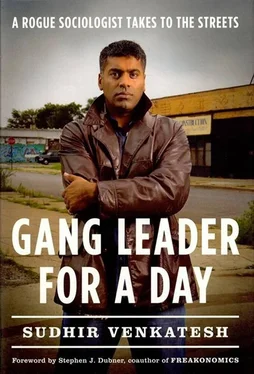Jimmy’s gave me a place to take off one hat (the fieldworker) and put on the other (the student). I needed this break, because I was starting to feel schizophrenic, as if I were one person in the projects-sometimes I caught myself even talking in a different way-and another back in Hyde Park.
Increasingly I found that I was angry at the entire field of social science-which meant, to some degree, that I was angry at myself. I resented the fact that the standard tools of sociologists seemed powerless to prevent the hardships I was seeing. The abstract social policies that my colleagues were developing to house, educate, and employ the poor seemed woefully out of touch. On the other hand, life in the projects was starting to seem too wild, too hard, and too chaotic for the staid prescriptions that social scientists could muster. It struck me as only partially helpful to convince youth to stay in school: what was the value in giving kids low-paying, menial jobs when they could probably be making more money on the streets?
In the poverty seminars that Bill Wilson sponsored, where some of the best academic minds congregated to discuss the latest research, I acted as if I had a unique insight into poverty by virtue of my proximity to families. I prefaced my questions by blurting out a self-serving objection: “No one here seems to have spent much time with the poor, but if you did, you would see that…” or, “If you actually watched poor people instead of just reading census tables, you would understand that…” I felt as though the other scholars were living in a bubble, but my arrogant tone did little to help anyone hear what I was trying to say. I worried that my behavior might embarrass Wilson, but I was too bitter to take a moderate stance.
I wouldn’t say that I was disillusioned with the academic life per se. I still attended classes, worked with professors and met my dead-lines, earned pretty good grades, and even received a few prestigious fellowships. I still saw myself on the road to being a professor like Wilson. But day by day, it was getting harder to reconcile my life at the U of C with my life in the projects.
Rather than sharing my frustration with my girlfriend, my room-mates, and my friends-most of whom were actually quite supportive and curious about my research-I just kept my experiences to myself. How could I explain the vigilante justice that C-Note and the others had just delivered? How could I explain my own role in the beating? I didn’t understand it myself, and I feared that I’d open myself up to my friends’ advice: You need to call the police if they don’t… You’re getting too involved… You’ve gone too far…
When I did try talking about my fieldwork, I felt awkward. In fact, I sometimes came off as defending the gangs and their violent practices or as romanticizing the conditions in the projects. So, to stay sane, I’d usually just tell people about Autry’s work at the Boys & Girls Club or, if pushed, a few stories about life in the gang.
I was growing quieter and more solitary. My fellow graduate students and even some faculty members thought of me as unapproachable. Rumors circulated that I was too ambitious, too aloof, but I figured I’d just have to live with them. A small part of me hoped that life would get back to normal once my fieldwork was over. But the end didn’t seem very near, so I just kept to myself.
I was eager to know more about the incident with Bee-Bee. Why had Ms. Bailey sicced the squatters on him instead of leaving it to the police? Had the police been called-Catrina said they hadn’t, but I wanted to be sure-and if so, why didn’t they respond? What were the consequences for Ms. Bailey of taking such matters into her own hands?
I waited until “check day” to go see Ms. Bailey. That’s when welfare checks were distributed, which meant that most tenants were out buying food and clothing and household items-and not, therefore, coming to Ms. Bailey with demands.
On the way up to her office, I stopped in to see J.T. He was lying on the sofa, watching TV. Ms. Mae gave me a big hug and told me to sit down for lunch. She had cooked some of my favorites-okra, greens, mac and cheese-and so I gladly obliged. J.T. quipped that I was eating his share of food. “You’re becoming the little brother I never wanted,” he said.
I told him about Ms. Bailey and the Bee-Bee incident. “Oh, man!” he said with a laugh. “That’s why she’s so upset. She keeps asking if I’ve seen you.”
“Why’s she upset at me?”
“Because you beat the shit out of that man, the one who beat Taneesha. I told you to be careful with Ms. Bailey, not to do things for her.”
“First of all, I didn’t do anything. Blue was choking, so I kicked the guy to help him.”
“That’s not really why she’s upset.” J.T. sat up. “She thinks that you were spying for us. Remember when I said that she doesn’t use us as much anymore? We could’ve taken care of the man who did that, but she didn’t ask us. She asked those fools, C-Note and those crackheads.”
I knew that J.T. had tried to persuade Ms. Bailey to call him when a woman in the building got beat up. But I also knew, from Catrina, that Ms. Bailey wouldn’t call J.T. because his gang members were known to physically and sexually abuse women.
By now J.T. was in lecture mode. “That’s why I told you not to do things with her. Because I can’t be there to protect you. She already knows that you’re with me, so she doesn’t trust you.” According to this theory, Ms. Bailey must have thought I was spying for the gang, keeping track of how often she used non-gang affiliates for enforcing justice in the building.
I was taken aback when J.T. said that I was “with” him. I hadn’t thought my relationship with J.T. would affect my work with Ms. Bailey-and I certainly wouldn’t have predicted she would see me as a spy. His casual aside left me unsure of how to talk with different people in the projects. Once again I was being asked to pick sides. Was it possible, I wondered, to be in the projects for any length of time and remain neutral, an outsider, an objective observer?
J.T. urged me to go see Ms. Bailey immediately. “You might as well deal with this shit,” he said. “It’s not going away.” He changed the channel.
As I headed for Ms. Bailey’s office, I thought that I should probably just confess the truth: I hadn’t asked her permission to join C-Note, and I had participated-however minimally-in the beating of Bee-Bee.
Catrina was leaving as I entered. She said nothing, just shook her head as if in disapproval. I stepped into Ms. Bailey’s office. “Ms. Bailey, I have to apologize.” I told her about my involvement with Bee-Bee.
She stared at me for a while. I fidgeted.
“That’s not really what bothers me, Sudhir,” she finally said. “What bothers me is that you are seeing things and you may not be ready for it.”
“I’m not sure I understand.”
“See, if you were in a war and you were a reporter, you could just say what’s going on. No one would be mad at you. But this ain’t a war. I try to tell you that all the time. It’s every day. Every day something happens like what happened to ’Neesha. And you’re getting yourself in the middle. People are saying, ‘Sudhir’s tough, he beat up that man almost by himself. He’ll do things for us.’ You understand why that’s a problem?”
“I’m not sure. You think they’ll hire me to beat up people?”
“They might, they might not. But they will start talking about you. Sometimes they’ll give you credit, and sometimes they’ll blame you. Understand?”
I didn’t answer.
“And when you say, ‘No, I can’t help you with that,’ they’ll say, ‘But you helped ’Neesha, so why won’t you help me?’ Then they’ll say, ‘Sudhir don’t care about us,’ or ‘Sudhir is ’Neesha’s manager.’ Then they’ll say, ‘Sudhir is working for Ms. Bailey, and he don’t do nothing unless he gets paid.’ Get it?”
Читать дальше












